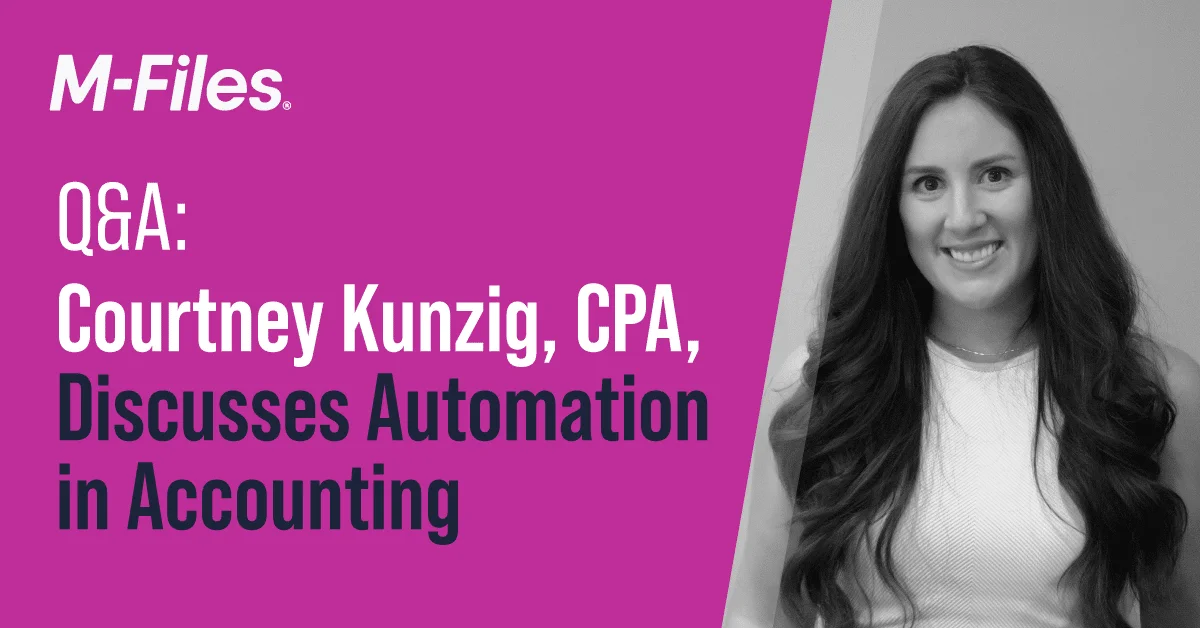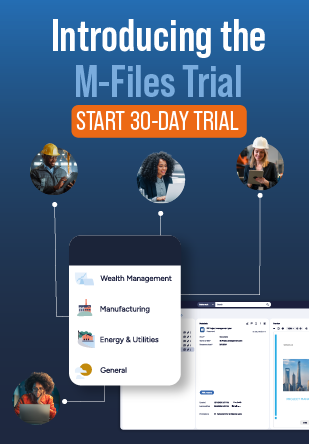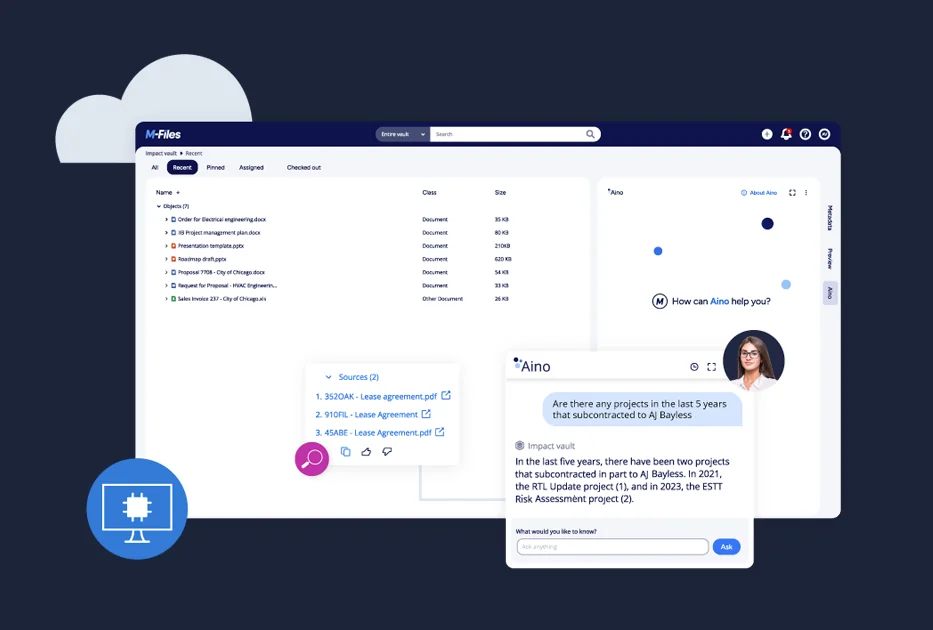CPA Courtney Kunzig Discusses Automation in Accounting

Knowledge work automation is poised to reshape multiple industries. This is especially true in professional services. In this sector, knowledge is often the primary deliverable.
Accounting industry workers handle huge amounts of client data. They also manage sensitive information and face tight deadlines. Workflows, security and compliance, client satisfaction, and firm growth are major priorities for these professionals.
M-Files Accounting Industry Solutions Manager Courtney Kunzig discusses how knowledge work automation helps accountants and other professional services workers work smarter. And working smarter means they can focus on creating value for their clients and firms.
Challenges in Accounting
What are some specific needs of accounting professionals in terms of knowledge work?
Security and compliance is huge and will always be relevant for the industry. Each firm has a duty to protect their clients' information and provide safe methods to share, gather, and store sensitive client information.
The accounting industry is highly regulated by its own governing bodies as well as governmental agencies.
These regulatory bodies are always looking for ways to improve the profession and regularly issue new rules, guidelines, and standards which can make it difficult for accountants to keep up with changes.
Knowledge work automation systems can assist in providing a robust security environment in the sense that it automates your security controls and reduces overall business risk. They can apply new rules across all objects without interfering with daily operations or end user involvement.
Some of the administrative or repetitive tasks firms endure can and should be automated. For example, the regulatory requirement to retain documents for seven years. The review and purge can be done automatically with the right systems in place. Similarly, automating permissions and access can ensure sensitive client data is protected and only relevant members of the firm have access to view it.
End-to-end knowledge work automation systems improve firm growth. They allow firms to consistently provide the same client experience across numerous client engagements. This protects and bolsters their firm reputation. It also improves speed to delivery—accountants can standardize and replicate processes quickly and systematically, allowing them to do more as they utilize better resources. Additionally, these end-to-end systems allow for more integrations. This saves time and improves data accuracy by distributing the same master information across all systems automatically.

Digital Transformation
Talk about how AI automation is transforming accounting.
The accounting industry is slow to change or adopt emerging technologies. however, firms are starting to invest in modernizing operations and tech stacks.
The Big Four firms are putting billions of dollars into AI R&D in anticipation of AI's effect on the accounting industry. AI can analyze large data sets for specified criteria, anomalies and more, allowing professionals to identify and understand relevant information faster.
The ability of AI to summarize documents is also vital in saving time. For example, instead of an accountant having to scan hundreds of pages of a commercial lease document, AI can quickly analyze them and point to the correct pages and lines in the document during review.
AI will also enhance security and compliance. One example: AI can redact sensitive client such as Social Security numbers or tax IDs while analyzing data. This will prevent non-authorized users from viewing sensitive information. This can be particularly relevant in preventing data loss as accounting firms experience high employee turnover each year.
How do you see the automation of knowledge work meeting the needs of the accounting industry?
We have to start by educating accounting firms on what this new terminology means. Knowledge work automation goes beyond document management and supports accountants in automating administrative and repetitive tasks so they can focus on new offerings or more complex areas of an engagement.
Firms need to open their eyes to the potential of implementing a knowledge work automation platform as the industry changes. We're seeing labor shortages, the introduction of AI, new revenue streams such as client advisory services and ESG reporting regulations and more. Firms need to find ways to keep up with the industry changing around them. They are also seeing significant pressure from clients to do more work faster. They must introduce technology to meet the growing needs of their client base to remain competitive.
Who Benefits from Knowledge Automation?
Do you see any kinds of accounting organizations being receptive to knowledge work automation?
Absolutely. There's been a large shift toward the creation of innovation teams or digital transformation teams internally within accounting firms. These teams are dedicated year-round to analyzing firms' tech stacks and identifying areas for improvement. This allows firms to scope, research, and implement new technologies as seen fit even during busier seasons.

On the flip side, internal accounting departments have so many documents, so many invoices, and a lot to track in general. They also maintain sensitive information such as salary and payroll information. Using knowledge work automation to embed security controls and manage information is really important for internal departments.
What functions and features make knowledge work automation a valuable tool for accounting teams?
There are so many features that could benefit accountants. For example, knowledge work automation can standardize all naming conventions such as client, engagement, etc. Client information will automatically be tagged with the same spelling and punctuation, eliminating issues such as, for example, sorting "M-Files and Co." in a different folder than "M-Files and Company." This keeps users and systems consistent and saves time by ensuring a single source of truth.
Standardizing documents via firm-approved templates and indexing, helps new staff find historical information on clients which, in turn, increases the speed to ramp up an engagement and also improves client satisfaction—clients don't have to resend historical documentation or explain the same concepts year-over-year.
Additionally, workflow automation makes communication among departments easier. With workflows, partners and managers can request staffing for an engagement. HR will receive the notification automatically and assign staff. Workflows can include documents and objects, and they connect to other systems via integrations to minimize manual contact and maximize automated tasks and processing. There’s no need to risk communication getting lost in an email inbox. Keeping all the information in one place and automating it is a huge benefit.
Metadata is also ideal for content management to help others easily find what they need. Enterprise content management systems, powered by metadata, provide a single source of truth with no folder hierarchy to navigate. You can search by document content, client, engagement, or year—a game changer for accountants as they onboard with a new firm or client.
Key Takeaways for Accounting Professionals
Name three things you want people in the accounting industry to know about knowledge work automation.
The future of accounting looks wildly different than many of us may have anticipated in 2018 now that we're in 2024. Firms need to take AI advancements seriously as the landscape recruitment, client expectations, regulation, and technology may be more uncertain than ever. Accounting firms need to be prepared with heightened capacity by leveraging technology to meet demand.
Firms interested in scaling through M&A transactions or making ownership changes with PEGs can make these transactions more seamless with technology platforms that connect readily to new and legacy systems. This will minimize many of the pains that come along with change management.
Lastly, everyone can benefit from improved security and compliance, ensuring your information is safe prior to extensive employee training. With the right security controls embedded in a knowledge work automation platform, you can trust the same secure processes will be applied correctly every time without end user involvement.









